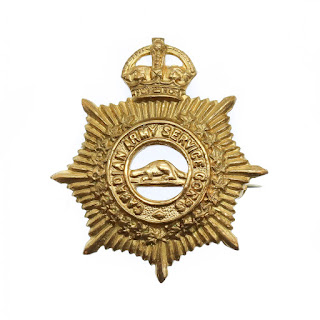Sergeant Wellington J. Middleton
8th Canadian Mounted Rifles, Canadian
Army Service Corps
Regimental Number 111617
Wellington
“John” Middleton was born on November 1st 1894 in Warsaw, Ontario.
He was the son of William, a labourer, and Sarah (Mosser) Middleton.
Wellington
grew up in Dummer, but likely moved to Peterborough when he became working
age. He was working as a liveryman, when
at age 20, he enlisted with “B Squadron” in the 8th Canadian Mounted
Rifles Battalion, the second contingent of men to be raised in Peterborough
during the Great War. He was described as having a fair complexion, blue eyes
and fair hair. He was single, and a
Presbyterian. Middleton indicated that
he had four year’s previous military service with the 3rd Prince of Wales
Dragoons, a local militia unit. He was
considered fit for military service and given the rank of Private.
Private
Middleton and his B Squadron comrades left Peterborough on March 8th
1915 for Ottawa, where they joined close to 1,600 other recruits from various
parts of Ontario to complete the 8th Canadian Mounted Rifles battalion
(CMR). The battalion trained there for
close to two months before being moved to Barriefield Camp, near Kingston.
At
Barriefield the Mounted Rifles continued their training and would become even
more familiar with the marches, drills and physical exercises that
characterized the Canadian’s notion of military training in the early years of
the war. By that time, reorganization of
the Canadian Expeditionary Force was in progress and it was soon learned that
the 8th Canadian Mounted Rifles were to be broken up, with a
majority of the men, including Wellington, to transfer to the 6th Mounted
Rifle Battalions. This was a tough blow to
the men, and one which was further exacerbated when they learned that they would
not go to the front as horse-mounted cavalry, but rather as regular infantry.
After
several months training at Barriefield, the men of the 6th Mounted
Rifles left Canada for England arriving there on September 5th 1915. Wellington was stationed at the Canadian Camp
at Shorncliffe to await further training and posting to the front. A bout of sickness and a stay at the hospital
on October 11th, sidelined him for a month. Two weeks after his discharge, in mid-November,
Middleton was reassigned to the Canadian Army Service Corps as a pay clerk and promoted
to Acting Corporal. By the end of February 1917, he was reassigned to the Depot
of Supply, most likely in a similar clerical role, and received another
promotion a month later to Acting Sergeant.
The advancement in rank did not last long, as four days later he was
transferred back to the Canadian Army Service Depot, reverted to the rank of
Private and entered a military hospital.
Wellington
was treated at three different hospitals over the course of four months before being
discharged to the Canadian Army Service Depot training Depot. After two months he was transferred to the Canadian
Military Police and worked as a clerk at Shorncliffe Camp, as well as receiving
a promotion to the rank of Acting Corporal.
Wellington fell ill again on May 13th 1917 and entered the hospital
for another three months before being posted back to his role with the Military
Police in the Army Service Corps Depot on July 7th.
Wellington
continued to seek treatment at English hospitals throughout the summer of 1917. One report in early July described him
suffering from scabies and orchitis, an inflammation of the testicles. The examiners noted that this condition might
have been exacerbated when he was kicked by a mule while on duty with his
battalion. The condition was treated, and though Wellington still reported pain
and general weakness by the end of August, he was discharged to duty on September
25th.
By
November 2nd, a significant change in posting was in the works for
Wellington, as he reverted in rank to Private for the purpose of joining the 129th
Company of the Canadian Forestry Corp.
This transfer was approved and a week later he joined the Forestry Battalion,
most likely in a clerical role, in the camp at Inverness, Scotland. Wellington
remained with the Forestry Corps for five months before returning to the
Canadian Service Corps base at Shorncliffe at the end of April 1917.
He
remained in England, until he was finally given orders to proceed overseas to France
with the Army Service Corps on September 15th, 1918. Wellington served the remainder of the war in
the Canadian Section of the 1st Echelon General Headquarters, before
being assigned to the Canadian Overseas Rail and Transport Depot on March 18th
1919.
He
returned to England in July, and served in various clerical postings, such as in
the Motor Transport, and in the Pay, Duty, Rations, Clothing Department in the Military
Hospital in Epsom, before being demobilized and shipped back to Canada on September
12th.
Middleton
sailed home aboard the SS Regina, and was formally discharged from service on September
23rd, 1919.
Sources
Canada. "Military Service File of Wellington John Middleton." Library and Archives Canada, Ottawa: Record Group 150, Accession 1992-93/166, Box 6158-21. Item Number 189816
Canada. "Military Service File of Wellington John Middleton." Library and Archives Canada, Ottawa: Record Group 150, Accession 1992-93/166, Box 6158-21. Item Number 189816

No comments:
Post a Comment